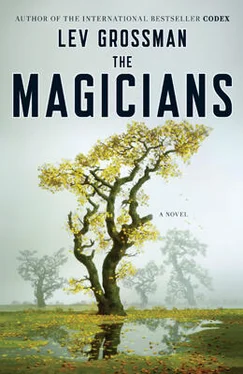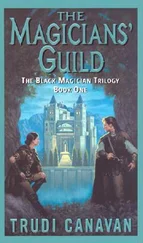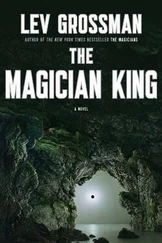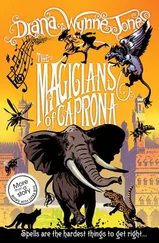And Julia — something had happened to his delicate, freckly Julia while he was away. Was it just that he didn’t love her anymore? Was he seeing her clearly for the first time? But no, her hair was longer now, and it was flat and lank — she had done something to tamp down the waviness — and there were dark circles under her eyes that hadn’t been there before. Before she only ever smoked at parties, but now she lit cigarette after cigarette, one off the other, feeding each one down the end of a hollow steel fencepost when she was done. Even James seemed unnerved by her, tense and protective. She observed them both coolly, her black skirt blowing around her bare knees. Afterward he couldn’t have said for sure whether she’d even spoken at all.
That night, already jonesing for a taste of the magical world he’d just left, Quentin rifled through his old paperbacks for a Fillory novel and stayed up till three in the morning rereading The Flying Forest , one of the more incidental, less satisfying installments in the series, which featured Rupert, the goofy, feckless Chatwin brother. He and pretty, princessy Fiona find their way into Fillory via the upper branches of Rupert’s favorite climbing tree and spend the novel searching for the source of a ticking sound that’s keeping their friend Sir Hotspots (he’s a leopard, with exceptionally sharp ears) from sleeping.
The culprits turn out to be a tribe of dwarves who have hollowed out an entire mountain of copper-bearing rock and fashioned it into an immense timekeeping device (Quentin had never noticed before how obsessed Plover was with clockwork). In the end Rupert and Fiona enlist a friendly giant to simply bury the clock deeper with his enormous mattock, muffling its monstrous ticking noise, thereby mollifying both Sir Hotspots and the dwarves, who, as cave dwellers, liked being buried. Then they repair to the royal residence, Castle Whitespire, an elegant keep cunningly constructed as a giant clockwork mechanism. Wound by windmills, a great brass main-spring beneath the castle moved and rotated its towers in a slow, stately dance.
Now that he had been to Brakebills and knew something about real magic he could read Plover with a more critical eye. He wanted to know the technical details behind the spells. And why were the dwarves building that giant clock in the first place? And the denouement didn’t strike him as especially final — it reminded him too much of “The Tell-Tale Heart.” Nothing stays buried forever. And where was the flying forest in The Flying Forest ? Where were Ember and Umber, the stately twin rams who patrolled Fillory and kept order there? Though they rarely showed up till after the Chatwins had already taken care of things for them. Their real function seemed to be to make sure the Chatwins didn’t overstay their welcome — it was Ember and Umber who regularly evicted them and sent them back to England at the end of each book. It was Quentin’s least favorite thing about the series. Why couldn’t they just let them stay? Would that have been so bad?
It was obvious that Christopher Plover didn’t know anything about real magic. He wasn’t even really English: according to the flap copy he was an American who’d made a quick fortune in dry goods in the 1920s and moved to Cornwall just ahead of the stock market crash. A confirmed bachelor, as the saying goes, he embraced Anglophilia, began pronouncing his name the English way (“Pluvver”), and set himself up as a country squire in a vast home crammed with staff. (Only an American Anglophile could have created a world as definitively English, more English than England, as Fillory.) Legend had it that there actually was a family of Chatwin children, who lived next door to him. Plover always claimed that the Chatwin children would come over and tell him stories about Fillory, and that he just wrote them down.
But the real mystery of The Flying Forest , endlessly analyzed by zealous fans and slumming academics, lay in the final few pages. With the ticking problem taken care of, Rupert and Fiona are settling down to a celebratory feast with Sir Hotspots and his family — including an appealingly slinky leopard bride and any number of adorable fuzzy leopard kittens — when who should turn up but Martin, the eldest Chatwin child, who first discovered Fillory two books ago in The World in the Walls .
Martin is thirteen years old by now, a pubescent teenager, almost too old to be adventuring in Fillory. In earlier books he was a changeful character, whose moods swung from cheerful to black without warning. In The Flying Forest he’s in his depressive phase. It’s not long before he picks a fight with the younger, more dependably sunny Rupert. Some very English yelling and wrestling ensues. The Hotspots clan observes the proceedings with amused leopardly coolth. Breaking away, his shirt untucked and missing a button, Martin shouts at his siblings that it was he who had discovered Fillory, and it was he and not they who should have gotten to go on the adventure. And it wasn’t fair: Why did they always have to go home afterward? He was a hero in Fillory and nothing at home. Fiona icily tells him not to behave like a child. Martin stalks away into the dense Darkling Woods, weeping wimpy English schoolboy tears.
And then… he never returns. Fillory swallows him whole. Martin is absent from the next two books— A Secret Sea and the last book in the series, The Wandering Dune —and although his siblings hunt for him diligently, they never find him again. (Now it made Quentin think of poor Alice’s brother.) Like most fans Quentin assumed that Plover meant to bring Martin back in the last book of the series, restored and repentant, but Plover died unexpectedly in his fifties while The Wandering Dune was still in manuscript, and nothing in his papers ever suggested an answer to the riddle. It was an insoluble literary mystery, like Dickens’s unfinished Mystery of Edwin Drood . Martin would always remain the boy who vanished into Fillory and never came back.
Quentin thought the answer might have been in the book he’d possessed so briefly, The Magicians , but it was long gone. He’d turned the House inside out and interrogated everybody in it, and by this point he’d given up. Someone at Brakebills must have taken it or tidied it up or lost it. But who, and why? Maybe it hadn’t even been real.
Quentin woke up early that Sunday morning already in fully fledged flight mode. He was spinning his wheels here. He had his new life to get on with. Feeling only the barest required minimum of guilt, he improvised an elaborate fictional confection for his parents — rich roommate, ski chalet in New Hampshire, I know it’s last minute but could he please? More lies, but what could you do, that was how you rolled when you were a secret teenage magician. He packed hurriedly — he’d left most of his clothes at school anyway — and half an hour later he was out on the streets of Brooklyn. He went straight to the old community garden. He walked into the thickest part of it.
He ended up at the back fence, looking through it at the rusting play set in a neighbor’s yard. Could it really be this small? He remembered the garden as practically a forest, but now it looked thin and scraggly. For several minutes he tramped around through the rubble and broken weeds and pumpkin corpses frozen in the act of rotting, back and forth, feeling more and more nervous and embarrassed. What did he do last time? Did he need the book? He must be missing something, but he couldn’t think what. The magic wasn’t happening. He tried to retrace his steps exactly. Maybe it was the wrong time of day.
Quentin went to get a slice of pizza and take stock, praying that nobody he knew would walk by and see him there when he was supposed to be on his way to Mount Alibi in New Hampshire. He didn’t know what to do. The trick wasn’t working. It was all falling away from him. He sat there in a booth with his bags next to him staring at his reflection in the floor-to-ceiling mirrors — why do all pizzerias have mirrored walls? — and reading the police blotter in the Park Slope free weekly. The walls reflected each other, mirrors on mirrors, an infinite curving gallery. And as he sat there, the long, narrow, busy room became still around him, almost without his knowing it. The mirrors became dark, the light changed, the bare tile became a polished parquet floor, and when he looked up from the paper again he was eating his slice alone in the junior common room at Brakebills.
Читать дальше












